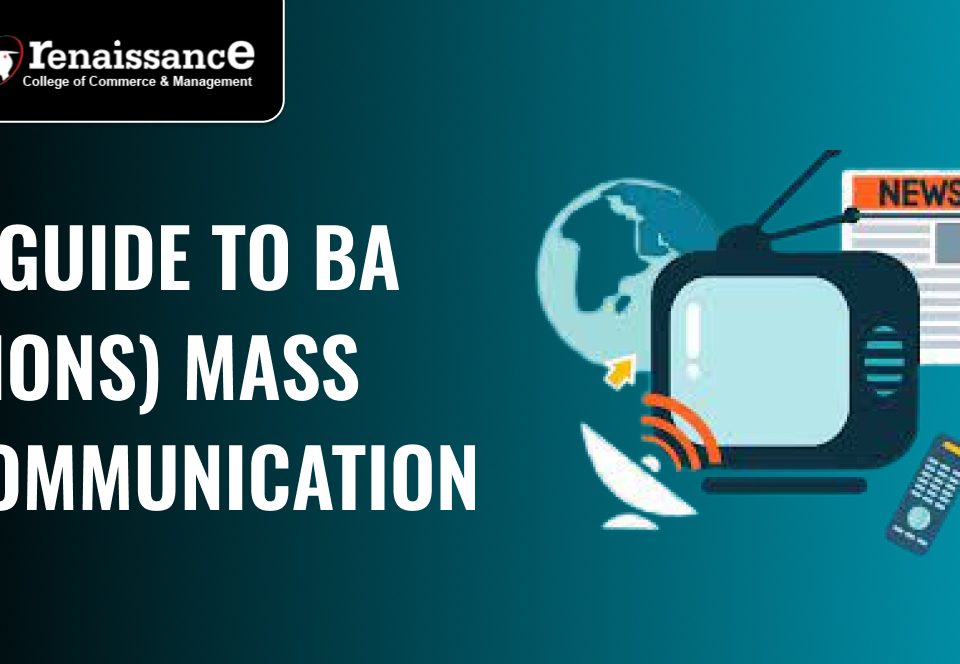BA (Honours) in Mass Communication | Fees | salary | Eligibility | Career | Best Mass communication college in Indore
What is BA (Honours) Mass Communication ?
Mass communication is a broad field that includes a wide range of mediums such as television, radio, newspapers, magazines, and the internet. It involves the creation, production, and dissemination of information to a large audience. A BA (Honours) in Mass Communication is a four-year undergraduate degree program that provides students with the knowledge and skills needed to pursue a career in the field of mass communication.
Eligibility criteria
The eligibility criteria for pursuing a BA (Honours) in Mass Communication in India vary depending on the institution. However, here are some general eligibility criteria that most colleges follow:
- Educational Qualification: Candidates must have completed their higher secondary education (10+2) from a recognized board of education in any stream.
- Minimum Marks: Most colleges require candidates to have a minimum of 50% marks in their higher secondary education. However, some institutions may have a lower or higher cutoff.
- Entrance Exams: Some colleges may require candidates to appear for an entrance exam, which may include written tests, group discussions, and personal interviews.
- Age Limit: There is no specific age limit for pursuing a BA (Honours) in Mass Communication. However, some colleges may have their own age criteria for admission.
It is important to note that the eligibility criteria can vary from institution to institution, so candidates should check the specific requirements of the college they are interested in applying to. Additionally, some colleges may offer relaxation in the eligibility criteria for reserved categories such as SC/ST/OBC and differently-abled candidates.
Fees and salary
- Fees: The fees for pursuing a BA (Honours) in Mass Communication in India can vary widely, depending on the institution and location. On average, the fees can range from INR 30,000 to INR 2,50,000 per year.
- Salary: The salary for graduates with a BA (Honours) in Mass Communication can also vary based on the chosen career path and location. On average, starting salaries for graduates can range from INR 2,00,000 to INR 5,00,000 per annum. With experience and specialization, the salary can increase up to INR 10,00,000 per annum or higher.
Top colleges of BA (Honours) in Mass Communication in India
- Renaissance college of Commerce and Management, Indore
- Jamia Millia Islamia, New Delhi
- Lady Shri Ram College for Women, New Delhi
- Christ University, Bangalore
- Symbiosis Centre for Media and Communication, Pune
- St. Xavier’s College, Mumbai
Curriculum of BA (Honours) in Mass Communication
The curriculum of a BA (Honours) in Mass Communication is designed to equip students with a comprehensive understanding of the field. It typically covers a wide range of topics related to mass media, including journalism, advertising, public relations, film studies, digital media, and communication theory. The program is usually divided into eight semesters, each of which covers a set of courses that build upon the knowledge and skills gained in the previous semesters.
In the first year, students are introduced to the fundamentals of mass communication, including the history, principles, and ethics of the field. They also learn basic writing, editing, and research skills that are essential for any career in mass media. In the second year, the focus shifts towards specific areas of mass communication such as journalism, advertising, and public relations. Students learn about news gathering, reporting, and writing for different media platforms, as well as the principles of advertising and marketing communications.
In the third year, students take advanced courses that delve deeper into the specialized areas of mass communication. They may choose to specialize in one or more areas, such as film studies, digital media, or media management. The fourth and final year usually involves an internship or a capstone project, where students apply their knowledge and skills to real-world situations.
The curriculum of a BA (Honours) in Mass Communication is designed to provide students with a broad understanding of the field while also allowing them to specialize in specific areas that interest them. The courses are taught through a combination of lectures, seminars, workshops, and hands-on projects, providing students with a well-rounded learning experience.
Skills Acquired through BA (Honours) in Mass Communication
A BA (Honours) in Mass Communication provides students with a range of skills that are essential for a successful career in the field. Here are some of the skills that students acquire through the program:
- Communication skills: Mass communication is all about effectively communicating information to a wide audience. Through coursework, students learn how to write, edit, and present information in a way that is clear, concise, and engaging.
- Critical thinking skills: Mass media is a complex and rapidly evolving field, and students learn how to think critically about the issues and challenges facing the industry. They learn how to analyze media messages, evaluate sources of information, and make informed decisions.
- Creative skills: Whether it’s writing a news story, creating a social media campaign, or producing a film, mass communication requires a high degree of creativity. Students learn how to generate new ideas, develop compelling messages, and use various media platforms to reach their target audience.
- Research skills: Mass communication relies heavily on research, whether it’s conducting interviews, gathering data, or analyzing media trends. Through coursework, students learn how to design and execute research studies, interpret data, and use research findings to inform their work.
- Technical skills: In today’s digital age, mass communication professionals must be proficient in a range of technical skills, including multimedia production, website design, social media management, and data analysis. The BA (Honours) in Mass Communication program provides students with hands-on experience in these areas, giving them a competitive edge in the job market.
The BA (Honours) in Mass Communication program provides students with a diverse set of skills that are highly sought after in the mass media industry. Graduates of the program are well-equipped to pursue a range of careers in journalism, advertising, public relations, film production, and digital media.
Types of mass communication courses
Mass communication courses are available at both undergraduate and graduate levels. Here are the different types of mass communication courses that are offered:
Undergraduate Courses:
- Bachelor of Arts (BA) in Mass Communication
- Bachelor of Science (BSc) in Mass Communication
- Bachelor of Mass Media (BMM)
- Bachelor of Journalism and Mass Communication (BJMC)
- Bachelor of Film and Television Production
Graduate Courses:
-
- Master of Arts (MA) in Mass Communication
- Master of Science (MSc) in Mass Communication
- Master of Mass Communication (MMC)
- Master of Journalism and Mass Communication (MJMC)
- Master of Film and Television Production
Additionally, there are also diploma and certificate courses in mass communication that are offered by various institutions. These courses can range from a few months to a year in duration and provide specialized training in areas such as digital media, advertising, public relations, film-making, and journalism.
It is important to note that the course names and structures can vary from institution to institution. Therefore, students should research and choose a course that aligns with their career goals and interests.
Specializations in mass communication
Mass communication is a broad field that encompasses various areas of communication. Specializations in mass communication allow students to focus on a particular area of interest and gain expertise in it. Here are some common specializations in mass communication:
- Journalism: This specialization focuses on news reporting, writing, and publishing in various media platforms such as newspapers, magazines, television, and online media.
- Advertising: This specialization involves creating and promoting advertisements for products or services across various media platforms. It includes developing creative concepts, designing visual elements, and executing campaigns.
- Public Relations: This specialization involves managing communication between organizations and their stakeholders, including the media, employees, investors, and the general public. It includes creating and implementing communication strategies, crisis management, and brand reputation management.
- Film-making: This specialization involves creating and producing films and documentaries for various media platforms. It includes developing scripts, directing, producing, and editing.
- Digital Media: This specialization focuses on the use of digital platforms such as social media, websites, and mobile applications for communication and marketing. It includes digital content creation, social media management, and digital advertising.
- Radio and Television: This specialization involves producing and broadcasting content for radio and television platforms. It includes program production, scripting, editing, and broadcasting.
Specializations in mass communication can vary depending on the institution and the country. Therefore, students should research and choose a specialization that aligns with their interests and career goals.
Career Opportunities
A BA (Honours) in Mass Communication opens up a wide range of career opportunities in the mass media industry. Here are some of the popular career paths that graduates can pursue:
- Journalism: Graduates can work as reporters, editors, or correspondents for newspapers, magazines, television stations, or online news outlets. They can cover a wide range of topics, such as politics, sports, entertainment, or business.
- Advertising: Graduates can work as copywriters, art directors, or account executives for advertising agencies, developing campaigns and promotional materials for clients in various industries.
- Public relations: Graduates can work as public relations specialists, managing the communication between organizations and the public, as well as promoting and protecting their clients’ reputation.
- Film and television production: Graduates can work in various roles in film and television production, such as directors, producers, or scriptwriters.
- Digital media: Graduates can work in various roles in the digital media industry, such as social media managers, content creators, or digital marketing specialists.
- Media management: Graduates can work in management roles in media organizations, such as media planners, media buyers, or media analysts.
- Education: Graduates can pursue careers in education, teaching mass communication courses at universities, colleges, or other educational institutions.
The BA (Honours) in Mass Communication provides graduates with a diverse set of skills that are highly valued in a variety of industries. Graduates can pursue careers in traditional media, as well as in emerging fields such as digital media and social media. They can also work in various roles in media organizations, as well as in education and research.
Advantages of Pursuing BA (Honours) in Mass Communication
- Diverse Career Opportunities: A BA (Honours) in Mass Communication prepares graduates for various career paths in the mass media industry, including journalism, advertising, public relations, film and television production, digital media, media management, and education. This diverse range of career opportunities allows graduates to choose a career path that aligns with their interests and strengths.
- Transferable Skills: Graduates of a BA (Honours) in Mass Communication acquire a broad range of transferable skills that are highly valued in many industries. These skills include communication, critical thinking, research, writing, and problem-solving, which can be applied to various fields beyond the mass media industry.
- Hands-On Experience: Many programs offer hands-on experience through internships, practicums, or research projects. This provides students with the opportunity to apply their knowledge in real-world settings, gain practical skills, and build their professional network.
- Industry-Relevant Curriculum: The curriculum of a BA (Honours) in Mass Communication is designed to keep up with the latest industry trends and developments, ensuring that graduates are equipped with the most up-to-date knowledge and skills.
- Personal Growth: Pursuing a BA (Honours) in Mass Communication can also lead to personal growth, as students are exposed to diverse perspectives, ideas, and cultures. This can broaden their worldview, enhance their creativity, and improve their communication skills.
Challenges and Limitations
- Competitive Industry: The mass media industry is highly competitive, and securing a job can be challenging, particularly for entry-level positions. Graduates may need to gain relevant experience through internships or entry-level jobs before securing a permanent position.
- Rapidly Changing Industry: The mass media industry is constantly evolving due to the impact of technology and changes in consumer behavior. Keeping up with these changes can be difficult, and graduates may need to continuously update their skills to remain relevant in the industry.
- Limited Opportunities in Small Markets: Opportunities in the mass media industry may be limited in small markets, which can make it challenging for graduates who are not willing to relocate.
- Workload: Pursuing a BA (Honours) in Mass Communication can be demanding, with assignments, projects, and exams requiring a significant amount of time and effort. Balancing academic work with other commitments, such as work or family, can be challenging.
- Ethical Concerns: The mass media industry can raise ethical concerns, particularly in the areas of journalism, advertising, and public relations. Graduates must be prepared to navigate these issues and make ethical decisions that align with their values.
In summary, pursuing a BA (Honours) in Mass Communication can be challenging due to the competitive and rapidly changing nature of the industry, limited opportunities in small markets, workload, and ethical concerns. However, with dedication, hard work, and a willingness to continuously update skills, graduates can overcome these challenges and build a rewarding career in the mass media industry.
Conclusion
In conclusion, pursuing a BA (Honours) in Mass Communication can be an excellent choice for individuals interested in a career in the mass media industry. This degree program offers students the opportunity to develop essential skills, including communication, critical thinking, and creativity, which are highly valued in today’s job market. Additionally, graduates can pursue a wide range of career paths, including journalism, advertising, public relations, and broadcasting.
While pursuing this degree can be challenging due to the competitive nature of the industry and other factors, graduates who are willing to work hard and continuously update their skills can build a rewarding career. a BA (Honours) in Mass Communication is an excellent investment for individuals who want to make a meaningful contribution to the world of media and communication.




